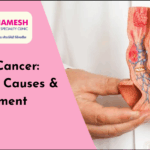What is Stomach Cancer?
Stomach cancer, also known as gastric cancer, is a condition where cancer cells proliferate uncontrollably within the stomach. Dr. Ashish Pokharkar, a renowned cancer specialist in Pune, emphasizes the importance of timely screening and awareness for this disease. Stomach cancer originates in the stomach’s inner lining, with symptoms often absent in the early stages, leading to late detection. The severity of the cancer depends on its size, spread, and overall health.
As part of the digestive system, the stomach receives and holds food before digestion. Cancer cells develop in the stomach lining, gradually forming tumors over the years. The diagnosis is challenging due to the limited early symptoms. Detection often occurs after the cancer has spread to other body parts, underscoring the significance of early intervention and regular screenings.
Types of Stomach Cancer
Adenocarcinomas of the stomach develop in the cells of the innermost lining. Most stomach cancer cases, about 90 percent to 95 percent, are adenocarcinomas.
Adenocarcinomas are broken down into two categories:
Intestinal adenocarcinomas are usually slow-growing and more treatable. Oftentimes, these cancers may be treated with therapy drugs that are designed to target specific mutations in cancer cells. This type most often occurs in men and older adults.
Diffuse adenocarcinomas are less common than intestinal adenocarcinomas and are usually more aggressive. They tend to be faster-growing, often spreading (metastasizing) to other parts of the body quickly. This type is more common at a younger age than intestinal adenocarcinomas.
Gastrointestinal stromal tumors (GISTs) originate from early cells in the stomach wall known as interstitial cells of Cajal. Predominantly found in the stomach, these uncommon tumors vary in their likelihood of spreading.
Nspreadingdocrine tumors (NETs), including carcinoids, initiate in stomach cells resembling both nerve and hormone-producing cells. While most NETs grow slowly, some may spread rapidly
Lymphomas, stemming from immune cells called lymphocytes, can manifest in the stomach wall. Treatment and prognosis hinge on lymphoma type and related factors. Refer to Gastrointestinal Stromal Tumor (GIST) and Gastrointestinal Neuroendocrine (Carcinoid) Tumors for more details.
Symptoms of Stomach Cancer
Loss of appetite: A reduced desire to eat, which can be indicative of various underlying health issues, including gastrointestinal problems, mental health issues, or systemic illnesses.
Trouble swallowing: Difficulty in moving food or liquids from the mouth to the stomach, which may be caused by conditions affecting the esophagus, such as strictures or motility disorders.
Fatigue or weakness: Persistent tiredness or lack of energy, which can result from a multitude of causes, including nutritional deficiencies, chronic diseases, or anemia.
Nausea and vomiting: Persistent feelings of queasiness, often accompanied by the actual expulsion of stomach contents. This can be caused by infections, gastrointestinal disorders, or other systemic issues.
Unexplained weight loss: Losing weight unintentionally and without a clear cause can be a concerning symptom and may indicate underlying medical conditions such as malabsorption, hyperthyroidism, or malignancies.
HeartburnHeartburn and indigestion: burning sensations in the chest or upper abdomen, often related to the reflux of stomach acid into the esophagus.
Black stool (poop) or vomiting blood: This may indicate bleeding in the upper gastrointestinal tract, possibly from conditions like peptic ulcers or esophageal varices. It requires urgent medical attention.
Feeling bloated or gassy after eating: experiencing discomfort due to excess gas or a feeling of fullness after meals, which may be related to dietary factors, gastrointestinal disorders, or functional issues.
Stomach pain: often above your belly button: Discomfort or pain in the upper abdomen, which could be linked to various issues such as gastritis, gallbladder problems, or inflammation of the pancreas.
Feeling full even after eating a small meal or snack: Persistent feelings of fullness that are disproportionate to the amount of food consumed, which may be associated with gastrointestinal disorders affecting digestion or absorption.
Causes of Stomach Cancer
Family History:
- Lynch syndrome
- Peutz-Jeghers syndrome
- Li-Fraumeni syndrome
- Familial adenomatous polyposis
- Hereditary diffuse gastric cancer
- Common variable immunodeficiency (CVID)
High-risk Dietary Habits:
- High intake of fatty, salty, smoked, or pickled foods
- Low consumption of fruits and vegetables
Environmental Exposures:
- Frequent exposure to coal, metal, and rubber
Lifestyle Factors:
- Smoking, vaping, or chewing tobacco
- Excessive alcohol consumption
- Obesity
Infections and Conditions:
- Helicobacter pylori (H. pylori) infection
- Gastroesophageal reflux disease (GERD)
- Gastritis
- Epstein-Barr virus infection
Health Conditions:
- Autoimmune atrophic gastritis
Diagnosis of Stomach Cancer
Stomach cancer diagnosis involves comprehensive testing if your doctor suspects its presence. The primary diagnostic tool is an endoscopy, where a flexible tube with a endoscope is used to examine the digestive tract by passing through the mouth, throat, and esophagus into the stomach. If suspicious areas are identified, a biopsy may be performed, involving the removal of a small amount of stomach lining tissue for microscopic examination. An alternative method, though less common, is endoscopic ultrasound, which incorporates an ultrasound probe at the end of the endoscope.
Upon receiving a stomach cancer diagnosis, emotions such as shock, distress, anxiety, or confusion are natural reactions. Coping mechanisms vary, and while some maintain daily routines, others may find it challenging. Communication with healthcare professionals, family, and friends becomes crucial. Seeking information, asking questions, and deciding on treatment involvement are personal choices, empowering individuals to navigate their stomach cancer journey with support and informed decisions.
Treatment for Stomach Cancer
Cancer Surgery plays a crucial role in treating and potentially curing malignant tumors in the gastrointestinal region. This specialized surgical procedure focuses on the precise removal of cancerous growths, aiming to eliminate the disease and restore health.
Chemotherapy, a cornerstone in oral cancer treatment, employs potent drugs to specifically target and annihilate cancer cells. This systematic approach aims to disrupt the rapid division of malignant cells, curbing the progression of the disease.
Radiation Therapy is a targeted intervention utilizing high-energy rays to destroy cancer cells or shrink tumors within affected organs and surrounding tissues. This precise application of energy is designed to minimize damage to healthy tissues while effectively combating the spread of cancer.
Palliative Care offers comprehensive support and symptom management to enhance the quality of life for patients with advanced cancer. This compassionate approach focuses on alleviating suffering, addressing emotional and physical needs, and promoting overall well-being during the challenging journey of cancer treatment.
Radiotherapy
Radiotherapy, using high-energy radiation, targets stomach cancer cells. Administered alone or with chemotherapy (chemoradiotherapy), it prevents recurrence and alleviates symptoms, enhancing overall treatment effectiveness and patient well-being.
How can you prevent Stomach Cancer?
having a diet high in fresh vegetables and fruit
Adopting a holistic approach to your lifestyle, including a balanced diet and regular health check-ups, can contribute to your overall well-being and reduce the risk of stomach cancer. Proactive measures and a health-conscious mindset empower you to take charge of your digestive health.
Family History Awareness
Be proactive about sharing any family history of stomach cancer with your healthcare provider. Individuals with a strong familial predisposition may benefit from stomach cancer screening. Early detection through screening tests can identify potential issues before symptoms arise.
Stop Smoking
If you currently smoke, consider quitting to safeguard your overall health. Smoking is a significant risk factor for stomach cancer and various other cancers. Quitting can be challenging, so seek support from your healthcare provider to increase your chances of success.
Include more fruits and vegetables in your diet
Ensure your daily meals incorporate a variety of fruits and vegetables to achieve a balanced nutrient intake.
Tell your health care provider if stomach cancer runs in your family.
People with a strong family history of stomach cancer might have stomach cancer screening. Screening tests can detect stomach cancer before it causes symptoms.
Conclusion
In conclusion, timely detection and thorough care are crucial for managing stomach cancer, also known as gastric cancer. Recognizing symptoms and seeking immediate medical attention is key. To prevent this condition, adopt a balanced diet, minimize risk factors, and maintain open communication with healthcare providers. Dr. Ashish Pokharkar, a highly regarded stomach cancer specialist in Pune, provides expert and compassionate care. With a holistic approach, he ensures the best possible outcomes for patients on their journey through stomach cancer treatment in Pune. Trust Dr. Ashish Pokharkar for personalized, effective stomach care in Pune.





